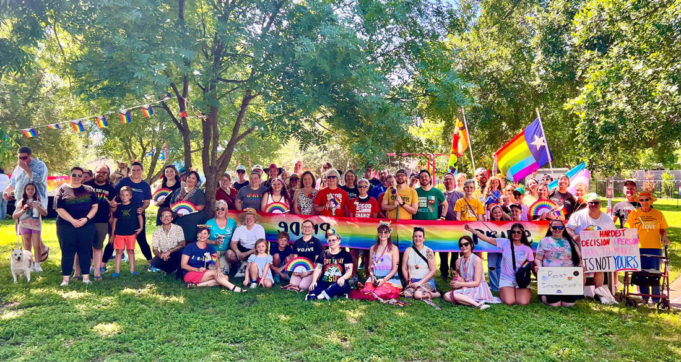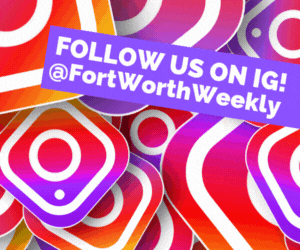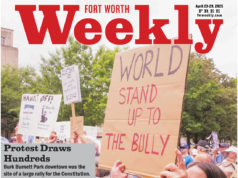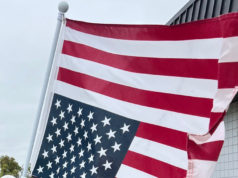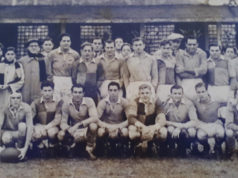The prescient words of George Orwell have been much on my mind lately. The author of 1984 wrote, “Who controls the past controls the future. Who controls the present controls the past.”
For the past several years, I’ve spent a great deal of time accumulating the remnants, rumors, and relics of Tarrant County’s LGBTQ history. During the COVID lockdown, I was delighted to find that my random posts featuring items from the archive along with often lengthy ramblings about bars, events, and people long gone found a steadily increasing audience.
Once we emerged from our post-pandemic seclusion, I began a series of Gay History Happy Hours at Liberty Lounge on the Near Southside. I quickly expanded my focus, which began primarily on LGBTQ nightlife, to encompass all aspects of our community experience. Shortly thereafter, YesterQueer, the Tarrant County LGBTQ History Project & Archive, was born, achieving official nonprofit status last month.
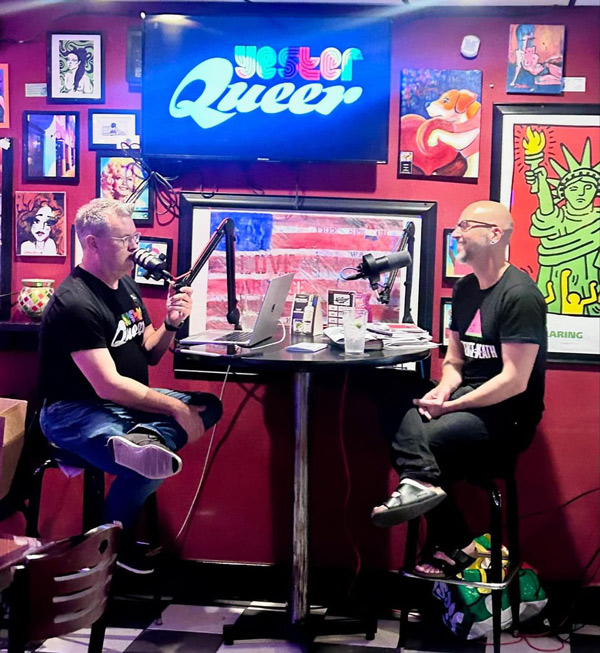
Courtesy YesterQueer
The work has been challenging. Legitimate sources are tough to come by, leaving much of the research to unreliable bar publications, scattered ephemera, and failing memories. My journalist credo of “Three sources, or it didn’t happen” was promptly dispatched, especially when assembling a chapter for the Handbook of Texas about the Researching these histories necessitates comfort in the gray areas, in which hard facts are hard to come by.
But documenting and preserving LGBTQ history has taken on a sense of urgency of late. In today’s political climate — in which LGBTQ rights are regularly under threat, institutions of higher learning are in the crosshairs of far-right state legislators, and “alternative facts” have become media staples — archiving this history has become an act of resistance and empowerment.
The importance of LGBTQ history is indisputable. The experiences, struggles, and triumphs which have shaped the community also played a crucial role in shaping society as a whole. One of the most informative ways to understand the boundaries of any society is by understanding its margins. By preserving these stories, we not only honor the resilience and bravery of those who fought for equal rights and recognition, but we dispel myths and misconceptions about LGBTQ individuals and foster greater empathy and acceptance among future generations.
When speaking to groups, I often stress the role of a broader historical knowledge in shaping our future. In short, how can we know where we’re going if we don’t know where we’ve been? Whether history repeats itself or merely rhymes, as Mark Twain is supposed to have said, today’s LGBTQ community is facing a fear-based assault similar to the one aimed at their queer forebearers.
The current war on drag performers as some type of newly invented menace to society is particularly laughable considering Fort Worth’s longtime love affair with “female impersonation,” which began drawing crowds in Cowtown as early as 1899. They were regularly featured performers in the city’s multiple downtown theaters from the turn of the century into the 1920s. When Fort Worth held its own Texas Centennial celebration in 1936, four drag performers were the opening attraction in Arlington Heights at a hell-themed nightspot called Dante’s Inferno, and a celebrated traveling impersonation group called the Jewel Box Revue enjoyed a five-week holdover run at the Skyliner Ballroom on Jacksboro Highway in 1951. Drag as entertainment existed long before Fort Worth itself.
MAGA Republican officials referring to LGBTQ folks as “groomers” is merely a warmed-up rehash of Anita Bryant’s “Save the Children” campaign from the 1970s.
It doesn’t seem to be sinking in here, though. Locally, the recent uptick of hateful, anti-LGBTQ antics by Mercy Culture Church have festered then fizzled. This past weekend, the anti-trans panel titled “Protect Kids” at the Fire Station Community Center on the Near Southside (“State Sanctioned,” June 5) was easily outnumbered by the children playing with their families at the Pride in the Park celebration taking place next door, and the annual Pride proclamation by Fort Worth City Council, a ceremonial softball, was canceled by three objecting councilmembers (Alan Blaylock, Macy Hill, and Charles Lauersdorf) just days before Arlington Pride broke attendance records last Saturday, with Fort Worth’s Trinity Pride festival still to come this weekend.
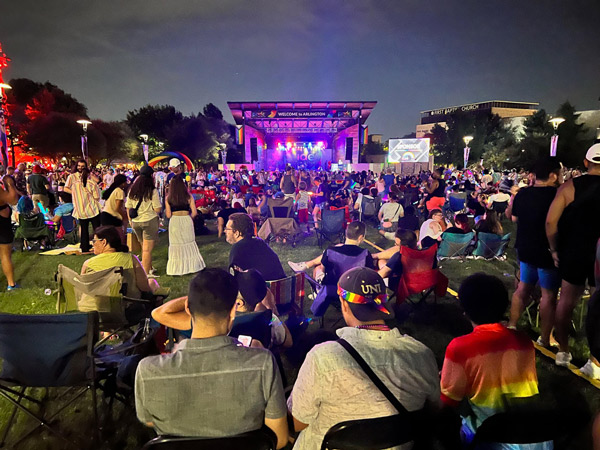
Photo by Todd Camp.
Perhaps some Fort Worth officials have forgotten the international black eye the city received when police raided the local gay bar the Rainbow Lounge on the 40th anniversary of the Stonewall Inn riots that ignited the modern LGBTQ rights movement. It was a confrontation that started because of police raiding a gay bar in New York’s Greenwich Village. There’s that nagging rhyme scheme again.
If only there was an organization dedicated to documenting these kinds of things to keep us from repeatedly stepping on the wrong side of the history rake. Oh, yeah. That’s one of many reasons YesterQueer is here.
Orwell was right to associate the ownership of the past with power in the present. We’re seeing attempts to obscure our diverse past, whether it’s “whitewashing” the teaching of the history of slavery in public schools, the continued glorification of a failed, treasonous Confederacy, or the reimagining of January 6 insurrectionists as merely tourists.
Good history is not a morality play. It is our collective attempt to understand why things happen. If we don’t include every aspect of the past in our understanding of the present, we come up with poorly written, wholly inaccurate history.
As we celebrate Pride Month, my work with YesterQueer remains hyper-focused on ensuring that the creative resistance and resilience of LGBTQ individuals are not erased or forgotten. These are stories that are worth telling, and they make us more cognizant of the context of our current struggles.
For generations of LGBTQ people, including an entire generation lost to HIV/AIDS, it’s crucial that their stories form part of collective memory. Through this process of learning, we move forward. And for the new generation of LGBTQ youth, this work exists to remind them that their experiences are part of a larger, ongoing narrative that can provide solace and validation.
At multiple YesterQueer events, attendees have stated that this work makes them feel less isolated, knowing that others have faced and overcome similar challenges. As good history does, these stories can also teach us about the tools that work. It helps to know that no matter how dark things may get, we’ve faced these challenges before, and we’ll live on to tell the tale.
And some of us will be there to keep those stories safe.
Todd Camp is executive director/founder of YesterQueer. Learn more at YesterQueerFW.com or on Facebook or Instagram.
Read about how Near Southsiders are rejecting right-wing rhetoric in our Peace Police article here.



